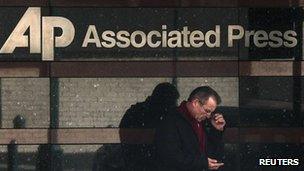Associated Press condemns US telephone record seizure
- Published

The government would not say why it sought the Associated Press telephone records
The Associated Press has described the US government's secret seizure of its journalists' telephone records as a "massive and unprecedented intrusion".
Chief executive Gary Pruitt said AP was told on Friday the justice department had gathered records of outgoing calls from more than 20 phone lines, external.
Mr Pruitt said there could be "no possible justification for such an overbroad collection".
The justice department has provided no explanation for the seizure.
However, officials have previously said the US Attorney's Office in the District of Columbia was conducting a criminal investigation into information contained in an AP story last year.
Published in May 2012, the article was about a CIA operation in Yemen that foiled an al-Qaeda plot to blow up a US-bound airplane.
Confidential sources
The story was embarrassing to the government, coming shortly after it had informed the public that there was nothing to suggest any such attack had been planned, says the BBC's David Willis in Washington.
Records for the phone numbers of five reporters and an editor who were involved in the AP story were among those obtained in April and May 2012.
AP said the seizure of records for general switchboard numbers and a fax line at its offices in New York, Hartford, in Connecticut, Washington DC and the House of Representatives was unusual and largely unprecedented.
"There can be no possible justification for such an overbroad collection of the telephone communications of the Associated Press and its reporters," Mr Pruitt wrote in a letter to US Attorney General Eric Holder, external.
"These records potentially reveal communications with confidential sources across all of the newsgathering activities undertaken by the AP during a two-month period, provide a road map to AP's newsgathering operations, and disclose information about AP's activities and operations that the government has no conceivable right to know."
It is not clear if the records seized included incoming calls or the duration of the calls. Nor is it clear whether a judge or grand jury approved the subpoenas.
News organisations are normally notified in advance if the government is seeking such information and are given time to negotiate.
The Obama administration has aggressively investigated disclosures of classified information to the media, bringing more cases against people suspected of leaking such material than any previous administration, our correspondent adds.
'Press intimidation'
Darrell Issa, the Republican chairman of the investigative House of Representatives Oversight and Government Reform Committee, criticised the seizure of records.
"They had an obligation to look for every other way to get it before they intruded on the freedom of the press," he told CNN.
Senator Patrick Leahy, the Democratic chairman of the Senate Judiciary Committee, said in a statement emailed to AP: "I am very troubled by these allegations and want to hear the government's explanation."
The American Civil Liberties Union accused the Obama administration of "press intimidation".
In a statement, the US Attorney's Office in the District of Columbia insisted it took seriously its obligations to "follow all applicable laws, federal regulations, and Department of Justice policies".
"Those regulations require us to make every reasonable effort to obtain information through alternative means before even considering a subpoena for the phone records of a member of the media," it said.
"Because we value the freedom of the press, we are always careful and deliberative in seeking to strike the right balance between the public interest in the free flow of information and the public interest in the fair and effective administration of our criminal laws," it added.
- Published8 May 2012